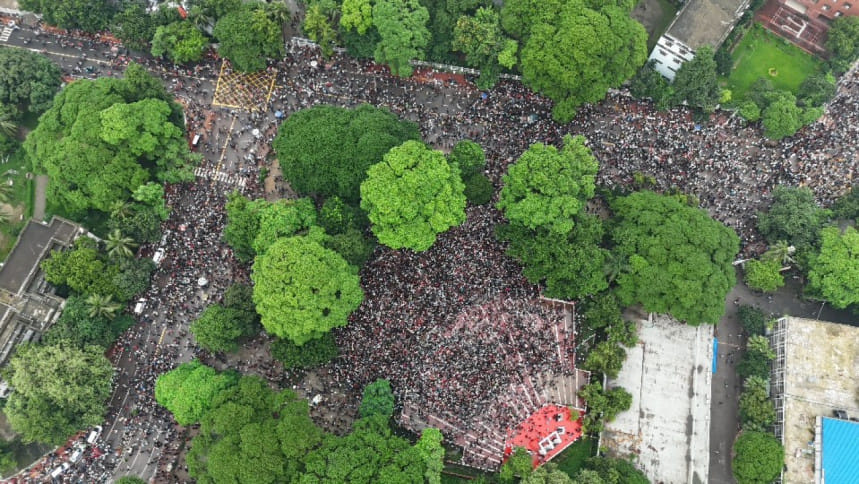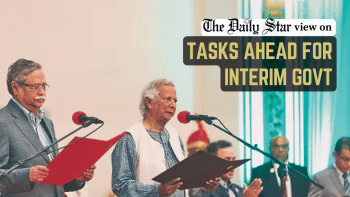Dear victorious student community of Bangladesh,
The recent triumph of your protests, culminating in Prime Minister Sheikh Hasina's resignation and departure, marks a pivotal moment in our nation's history. This watershed event echoes the transformative upheaval of 1990 known as "90's Anti-Authoritarian Movement," reminding us of the power of collective action and the enduring spirit of youth. Your passion, determination, and unwavering commitment to seek fairness and justice have once again proven to be a formidable force for change, placing you in a proud lineage of student activists and leaders who have repeatedly altered the course of our nation's history, starting from the Language Movement of 1952, culminating in the birth a new nation in the map of the world in 1971, i.e., Bangladesh, and then the restoration of parliamentary democracy in 1991.
As we reflect on this momentous achievement, we must recognise a fundamental truth about our national character. We Bangladeshis are emotional people, quick to ignite with passion, but unfortunately sometimes lacking in the sustained effort required for long-term transformation of those noble ambitions and positive aspirations which also brought you in the very first place to the streets as you fought to have a fair opportunity in government jobs. The tragic loss of innocent young lives, who died for a cause whose benefit they will never enjoy, is the ultimate sacrifice one can make for which the nation will remain indebted forever. The challenge that lies before you has now moved beyond the abolition of the quota system. It is time to channel today's emotional energy and patriotism into concrete actions of tomorrow for achieving a lasting positive change in Bangladesh for which you have sacrificed so much in such a short time.

It is crucial to note that your movement in 2024 stands apart from its predecessors, and in a significant way, as it mostly includes ordinary and non-political students. Unlike 1990, when Chhatra League and Chhatra Dal, the student wings of Awami League and BNP, respectively, played major roles, you have transcended party affiliations to be representative of all students, irrespective of their personal beliefs and political ideologies. You became something larger than life by serving as the conscience and voice of the nation as opposed to representing any particular political camp or ideology. This independence is both refreshing and commendable as it gives us hope to expect greater things to come from you that are driven by genuine love for the country, as opposed to petty partisanship and personal interests only.
Your protest and revolt are a testament to the power of technology in mobilising forces for positive change. Unlike the communication methods available in the 1990s, during the last student movement which led to the ouster of the corrupt and immoral military dictator Gen HM Ershad, you have harnessed social media and digital platforms to amplify your voices and coordinate your efforts. As we look back on the 1990 protests, we must never forget the sacrifice of those who came before you. Approximately 100 lives were lost in the struggle for democracy during that tumultuous period.
Reflecting on the period since 1991, when parliamentary democracy was restored, we see a mixed legacy of progress and missed opportunities for Bangladesh. Our GDP has grown from $31 billion in 1991 to $437 billion in 2023, a testament to our economic resilience. Life expectancy has increased from 54 years in 1991 to 74 years in 2022, reflecting improvements in healthcare and living standards. We have dramatically reduced poverty, with rates falling from 42 percent in 1991 to around 5.01 percent in 2022. Our infrastructure has seen remarkable improvements, with electricity access rising to almost 100 percent by 2022.
Alongside these achievements, we have also fallen short in several critical areas. Our democratic institutions remain fragile, with press freedom deteriorating to the point where Bangladesh now ranks 165th out of 180 nations in the 2024 World Press Freedom Index. Human rights conditions have worsened, and corruption continues to plague our society, with Bangladesh scoring its lowest in 12 years on the 2023 Corruption Perceptions Index. Perhaps most concerning for your future is the rise in youth unemployment, which has increased from 5.51 percent in 1991 to 15.74 percent in 2023, despite our economic growth.
It is crucial to note that your movement in 2024 stands apart from its predecessors, and in a significant way, as it mostly includes ordinary and non-political students. Unlike 1990, when Chhatra League and Chhatra Dal, the student wings of Awami League and BNP, respectively, played major roles, you have transcended party affiliations to be representative of all students, irrespective of their personal beliefs and political ideologies. You became something larger than life by serving as the conscience and voice of the nation as opposed to representing any particular political camp or ideology.
The commercialisation of politics has seen the nefarious rise of an elite group of businessmen-turned-politicians as politics has become the best business in town to make quick money with very little genuine entrepreneurial work and hardly any accountability behind it. You have been unfairly deprived of good role models in both politics and business, as is evidenced in the beneficiaries of this malicious culture, some of whom are now desperate to leave the country with their ill-gotten money, both at home and abroad, and stopped in the airports and borders. We have hardly succeeded to provide you with good examples to be inspired from—either in politics or in business. So, set examples, in both politics and business, that puts us to shame and makes your next generation proud of your achievements and successes as well as your character and integrity.
Your role, dear students, extends far beyond this moment of protest. You are the architects of Bangladesh's future, which I would like to label as "Vision 2050," and your responsibilities have only just begun. Engage deeply in policy discussions, pursue excellence in your chosen fields, and hold leaders accountable not just for today, but in the years to come. Let your actions be guided not just by emotion, but by a clear vision of the Bangladesh we can become. Cultivate the skills and knowledge needed to lead our nation into the future, whether in politics, public service, business, technology, arts, culture or sports.

As we look towards 2050, I urge you to envision a Bangladesh that has learnt from its past and boldly faces its future. Aspire to build a nation that stands in the world as a beacon of democracy, prosperity, and social justice. This vision should include a fully developed economy that has diversified beyond the ready-made garment sector, embracing technology and fostering innovation across various industries. Technology must play a central role in this vision. Your protest has already demonstrated how digital tools can be leveraged for social change. Now, imagine how these same technologies can be applied to governance, transparency, and accountability as well as entrepreneurism and enterprise.
To realise "Vision 2050," we must confront the shortcomings that emerged after 1991. Political polarisation, weak institutions, and rampant corruption have hindered our progress. To move forward, we need comprehensive reforms across various sectors. Constitutional changes must strengthen our democracy and prevent power concentration. Significant investment in digital infrastructure is crucial, not only for economic growth but also to enhance governance, transparency and efficiency. Robust anti-corruption measures, backed by stringent accountability systems, are essential.
Strive for an independent judiciary that ensures the rule of law and equal justice for all citizens, regardless of their social or economic status or political ideology. Transparent governance should be at the core of our political system, with robust mechanisms in place to promote accountability at all levels of government. Social equality must be more than just a slogan, with concrete steps taken to eradicate discrimination and ensure equal opportunities for all Bangladeshis, regardless of gender, religion or ethnicity. You fought for meritocracy whose one of the underlying principles is equal and fair opportunity to all, not for the few privileged only. Be vigilant to preserve and protect what you have earned with so much sacrifice.
Our education system demands a thorough revamp to meet challenges of the evolving global knowledge economy. Since the establishment of Bangladesh's first private university in 1992, we have witnessed a proliferation of higher education institutions, with over 100 private universities now operating nationwide. This rapid expansion, averaging more than three new universities annually, has undoubtedly increased access to tertiary education. However, this quantitative growth has not been matched by qualitative improvements. The quality of teachers has gone down at a much faster rate than the quality of students. As a result, the quality of education has, in many instances, deteriorated, failing to equip graduates with skills and knowledge demanded by the modern job market. In the 2024-25 global academic rankings, encompassing 2,250 top universities from over 100 countries, only five Bangladeshi institutions have secured notable positions, reflecting our weak standing in the competitive international higher education landscape and underscoring the need for improvement in the nation's tertiary education sector.
This misalignment between educational outcomes and industry requirements has contributed significantly to the rising unemployment rate among our youth. To address this critical issue, we must pivot towards an education system that emphasises critical thinking, problem-solving, and digital literacy. Our curriculum must be dynamic, continuously adapting to global best practices and anticipating future workforce needs at a time when skill sets have an average shelf life of three years as technology continues to challenge our intellect and abilities at breakneck speed. By fostering innovation, entrepreneurship, and practical skills alongside theoretical knowledge, we can better prepare our students to thrive in the 21st century global economy and reverse the trend of increasing youth unemployment. You, the students, deserve much better support from the country and its educational establishments.
In the health sector, while we have made significant strides in family planning, immunisations, and reducing maternal and infant mortality rates, the 2023 healthcare index places Bangladesh at 94th out of 94 countries, highlighting persistent challenges. Urban-rural disparities and systemic issues continue to hinder progress. We must prioritise reforms and investments for improving quality healthcare services accessible to all.
As you stand at this crossroads, do not repeat the mistakes of the past that many of your predecessors did. The euphoria of change must be matched with the diligence of nation-building. By 2050, let Bangladesh stand as a model of what can be achieved when a nation harnesses the energy of its youth and the wisdom of its experience. Build a country where democracy thrives, where the economy provides opportunities for all, where education opens doors to success, and where every citizen can live with dignity and hope.
As we progress towards 2050, we must prioritise climate change adaptation and sustainability. Bangladesh, being one of the most vulnerable countries to climate change, must lead by example. Envision a future where sustainable practices are not just encouraged, but are the norm. From green urban planning to renewable energy adoption, from sustainable agriculture to eco-friendly industries—let Bangladesh be a model of sustainable development. Remember, a sustainable lifestyle is not just an environmental imperative, but an economic one. By embracing sustainability, we can attract green investments, create new jobs, and position Bangladesh as a leader in the global green economy. Our economic planning must prioritise sustainable, inclusive growth that transcends political cycles and benefits all citizens.
As you embark on this journey, remember that life has a way of challenging our ideals. As you grow older, you may find that the purity of your thoughts is tested by new challenges and adversities, unexpected uncertainties and risks. The fervour of youth may be tempered by the complexities of adulthood. However, just as age is just a number, your youthful energy is more in your mind than in your body. I implore you to keep alive and agile the passion and determination to build a nation great in its humanity and fierce in its ambitions.
Let the idealism and patriotism that fuel you today be the compass that guides you through the challenges ahead. Please remember that everyone loves to be with the winner, which you are today. I have seen how some of the student leaders and heroes of the glorious student movement of 1990 got lured into the trap of greed and lust at the expense of their values and morals. Today, some of them are no less pathetic than the evil forces against which they fought valiantly at some point in their lives that resulted in the ouster of a corrupt and immoral military dictator in 1991, who was subsequently restored by our political parties with their marriage of convenience devoid of values and principles. In the process, they betrayed the likes of well-known protester Noor Hossain and Dr Milon, who made the ultimate sacrifice with their lives during those turbulent days.
Again, salute to you, the students, who time and again have shown the politicians what selfless acts of patriotism look like. However, the irony and lesson of history is that politicians in our country, except a few exceptions, hardly learn and seldom change until they are forced to do what they are supposed to do: love and serve the country selflessly. So, be vigilant and know how to discern between right and wrong, good and bad. Please remember that the choices you make today will shape the future that you aspire for tomorrow. Equally important is not to compromise your dignity for your destiny, as then it is not worth it.
As you stand at this crossroads, do not repeat the mistakes of the past that many of your predecessors did. The euphoria of change must be matched with the diligence of nation-building. By 2050, let Bangladesh stand as a model of what can be achieved when a nation harnesses the energy of its youth and the wisdom of its experience. Build a country where democracy thrives, where the economy provides opportunities for all, where education opens doors to success, and where every citizen can live with dignity and hope.
The path to 2050 is long and fraught with challenges, but with your passion tempered by wisdom, idealism coupled with pragmatism, you can build a Bangladesh that not only fulfils the dreams of our Liberation War, but exceeds them. Let this moment be the catalyst for a new era of progress, where the spirit of 1971 is finally realised in a truly free, fair, and prosperous Bangladesh where everyone—irrespective of social, economic, religious or ethnic identity—thrives on his/her merit and hard work, honesty and integrity, character and compassion, and last but not the least, an unflinching patriotism that neither gathers dust nor rots with the passage of time.
The future is in your hands, dear students. Shape it with an unwavering commitment to the greater good of our beloved nation. Your journey begins now, and with it, the promise of a brighter, more prosperous Bangladesh for generations to come. Where we failed, you will succeed for sure. We can't afford any more time wasted, or another generation lost as the euphoria subsidies and reality starts to kick in.
Finally, never be afraid to dream big and aspire for more. Let no challenge make you daunted, have faith in life and the goodness it brings, never shy away from speaking the truth and taking a stand—which you did so bravely. Keep on marching with courage and conviction, character and compassion—the nation is with you in thoughts, spirit, and prayers.
Prof Syed Munir Khasru is chairman of The Institute for Policy, Advocacy, and Governance (IPAG), an international think tank. He can be reached via www.syedmunirkhasru.org.
Views expressed in this article are the author's own.
Follow The Daily Star Opinion on Facebook for the latest opinions, commentaries and analyses by experts and professionals. To contribute your article or letter to The Daily Star Opinion, see our guidelines for submission.













Comments